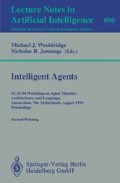Abstract
In this paper it is investigated how multi-agent systems with complex agents can be designed and formally specified based on the notion of a compositional architecture. After identifying the types of knowledge required for an agent we formally define a general multi-agent system. Moreover, a specific type of agent with various capabilities of reasoning and acting is given. Some essential patterns of integrated reasoning, communication and interaction with the material world are described. Finally, we present an overview of formal semantics for our approach.
This work is part of the ESPRIT III Basic Research project 6156 DRUMS II.
Preview
Unable to display preview. Download preview PDF.
References
Bouron, T. and Collinot, A., SAM: a model to design computational social agents. In: B. Neumann (ed.), Proc. 10th European Conference on Artificial Intelligence, ECAI'92, John Wiley & Sons, Chichester, 1992, pp. 239–243
Brazier, F.M.T. and Treur, J. User centered knowledge-based system design: a formal modelling approach. In: L. Steels, G. Schreiber and W. Van de Velde (eds.), “A future for knowledge acquisition”, Proceedings of the 8th European Knowledge Acquisition Workshop, EKAW '94. Springer-Verlag, Lecture Notes in Artificial Intelligence 867, 1994, pp. 283–300.
Dunin-Keplicz, B. and Treur, J., Formal modelling in multi-agent domains. Report, Free University Amsterdam, Department of Mathematics and Computer Science, 1994. Shorter version in: L. Steels, G. Scheiber, W. van de Velde (eds.), Position papers of the EKAW94, Technical Report 94-2, Vrije Universiteit Brussel, AI Lab, 1994
Engelfriet, J. and Treur, J., Temporal theories of reasoning. In: C. MacNish, D. Pearce, L.M. Pereira (eds.), Logics in AI, Proc. JELIA'94, Lecture Notes in AI, Vol. 838, Springer Verlag, 1994, pp. 279–299.
Fisher, M. and Wooldridge, M, Specifying and verifying distributed intelligent systems, Proc. of the 6th Portugese Conference on AI, Lecture Notes in AI, Vol. 727, Springer Verlag, 1993
Gavrila, I.S. and Treur, J., A formal model for the dynamics of compositional reasoning systems. In A.G. Cohn (ed.), Proc. 11th European Conference on Artificial Intelligence, ECAI'94, John Wiley & Sons, Chichester, 1994, pp. 307–311
Huhns, M. (ed.), Distributed Artifical Intelligence. Morgan Kaufman, 1987
Jennings, N.R., Towards a cooperation knowledge level for collaborative problem solving. In B. Neumann (ed.), Proc. 10th European Conference on Artificial Intelligence, ECAI'92, John Wiley & Sons, Chichester, 1992, pp. 224–228
Kowalczyk, W. and Treur, J., On the use of a formalized generic task model in knowledge acquisition. In: B.J. Wielinga, J. Boose, B.R. Gaines, A.Th. Schreiber, M.W. van Someren (eds.), Current Trends in Knowledge Acquisition (Proc. EKAW-90), IOS Press, Amsterdam, 1990, pp. 198–221.
Langevelde, I.A. van, Philipsen, A.W. and Treur, J., Formal specification of compositional architectures. In B. Neumann (ed.), Proc. 10th European Conference on Artificial Intelligence, ECAI'92, John Wiley & Sons, Chichester, 1992, pp. 272–276
Osawa, E.I., A scheme for agent collaboration in open multi-agent environments. Proc. Int. Joint Conference on AI, IJCAI'93, pp. 352–358.
Pannekeet, J.H.M., A.W. Philipsen and J. Treur, Designing compositional assumption revision, Report IR-279, Department of Mathematics and Computer Science, Vrije Universiteit Amsterdam, 1991. Shorter version in: H. de Swaan Arons et al., Proc. Dutch AI-Conference, NAIC-92, 1992, pp. 285–296
Treur, J., Interaction types and chemistry of generic task models. In: M. Linster, B. Gaines, (eds.), Proc. EKAW'91. GMD Studien 211, 1992, pp. 390–414.
Treur, J., Temporal semantics of meta-level architectures for dynamic control of reasoning. Proc. Int. Workshop on Meta-programming in Logic, META'94, Lecture Notes in Computer Science, Vol. 883, Springer Verlag, 1994.
Treur, J., Wetter, Th. (eds.), Formal Specification of Complex Reasoning Systems. Ellis Horwood, 1993
Author information
Authors and Affiliations
Editor information
Rights and permissions
Copyright information
© 1995 Springer-Verlag Berlin Heidelberg
About this paper
Cite this paper
Dunin-Keplicz, B., Treur, J. (1995). Compositional formal specification of multi-agent systems. In: Wooldridge, M.J., Jennings, N.R. (eds) Intelligent Agents. ATAL 1994. Lecture Notes in Computer Science, vol 890. Springer, Berlin, Heidelberg. https://doi.org/10.1007/3-540-58855-8_6
Download citation
DOI: https://doi.org/10.1007/3-540-58855-8_6
Published:
Publisher Name: Springer, Berlin, Heidelberg
Print ISBN: 978-3-540-58855-9
Online ISBN: 978-3-540-49129-3
eBook Packages: Springer Book Archive

